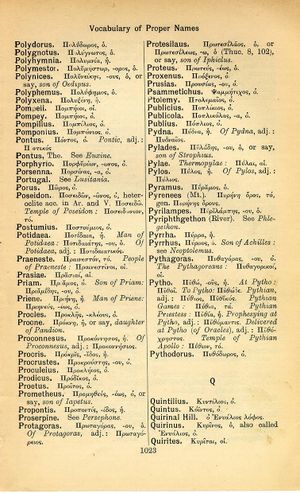Polyxena
ὁ γοῦν Ἀνάγυρός μοι κεκινῆσθαι δοκεῖ → did somebody fart, seems to me the Anagyros has been stirred up, I knew someone was raising a stink, the fat is in the fire
English > Greek (Woodhouse)
Πολυξένη, ἡ.
Latin > English (Lewis & Short)
Pŏlyxĕna: ae, f., = Πολυξένη,
I a daughter of Priam, whom Pyrrhus, the son of Achilles, sacrificed at his father's grave, Ov. M. 13, 448; Juv. 10, 262; Sen. Troad. 368; Hyg. Fab. 110; cf. Verg. A. 3, 321.— Hence,
II Pŏlyxĕnĭus, a, um, adj., of Polyxena, Polyxenian: caedes, Cat. 64, 369.
Latin > French (Gaffiot 2016)
Pŏlyxĕna,¹⁴ æ, f. (Πολυξένη), Polyxène [fille de Priam, immolée sur le tombeau d’Achille] : Ov. M. 13, 448 ; Juv. 10, 262 || -nĭus, a, um, de Polyxène : Catul. 64, 369. -xĕnē Sen. Troad. 376.
Latin > German (Georges)
Polyxena, ae, f. (Πολυξένη), Tochter des Priamus, Geliebte des Achilles, an dessen Grabe sie von seinem Sohne Pyrrhus geopfert wurde, Ov. met. 13, 448 sqq. Hyg. fab. 110: Nbf. Polyxene, Sen. Troad. 376 ed. Peiper (Vulg. Polyxena). – Dav. Polyxenius, a, um, polyxenisch, der Polyxena, caedes, Catull. 64, 368.

